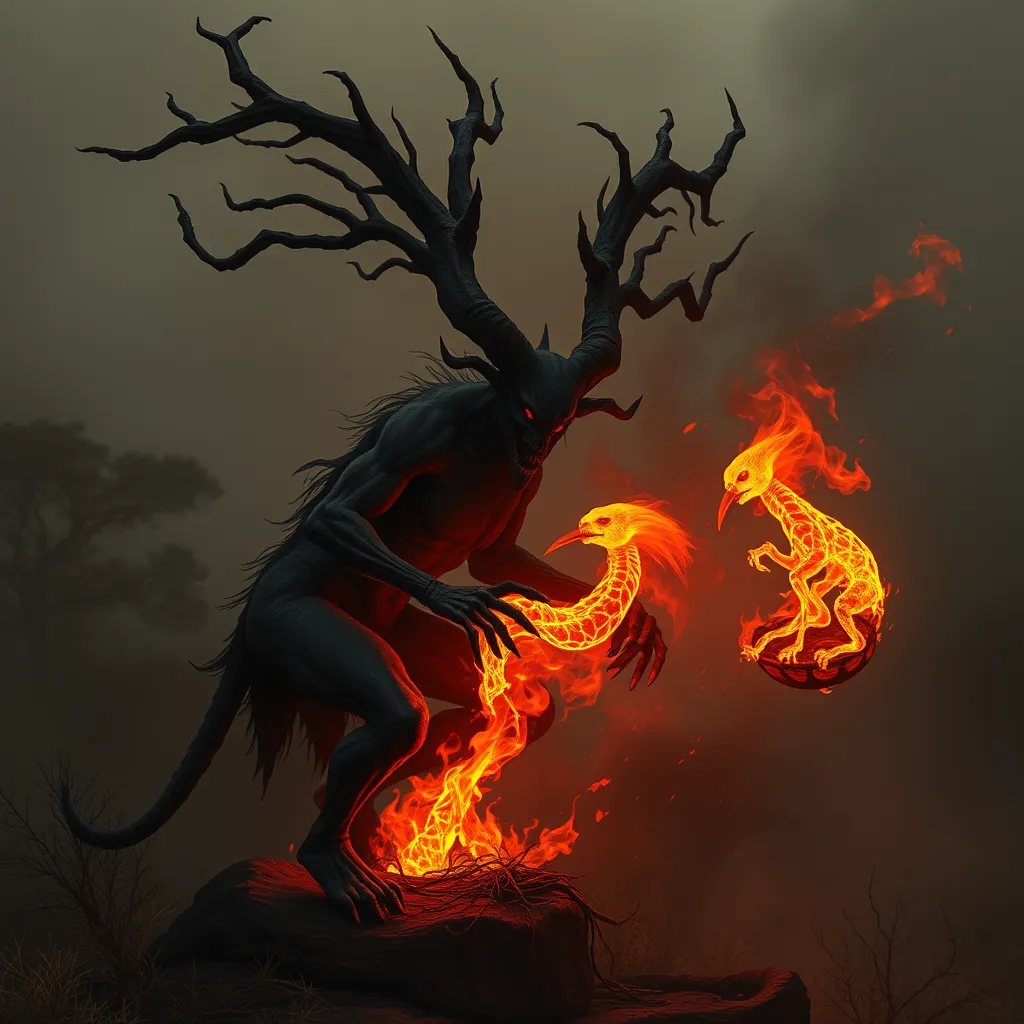The Rakshasa in African Folklore: The Demonic Spirits of the Bush
I. Introduction
The term “Rakshasa” originates from Hindu mythology, describing a class of powerful and malevolent spirits. In the context of African folklore, Rakshasa have taken on unique interpretations, embodying the fears, morals, and cultural narratives of various African societies. These demonic spirits are often viewed as protectors of the wilderness, reflecting the complex relationship between humans and nature.
Demonic spirits hold significant importance in African culture, serving as symbols of societal values, cautionary tales, and spiritual beliefs. The purpose of this article is to explore the role and characteristics of Rakshasa within African folklore, highlighting their historical origins, symbolic meanings, and their impact on contemporary culture.
II. Historical Origins of Rakshasa
The origins of Rakshasa can be traced back to ancient Hindu texts, where they are depicted as formidable foes of the gods and harbingers of chaos. As trade routes expanded and cultural exchanges increased, these spirits migrated to Africa, adapting to local beliefs and practices.
In African narratives, Rakshasa transformed from their original depictions, often being integrated into local mythologies and folklore. This evolution was influenced by various factors:
- The movement of peoples through trade and migration.
- The impact of colonialism, which often reshaped indigenous beliefs.
- The blending of different cultural narratives over generations.
III. Characteristics of Rakshasa
The Rakshasa of African folklore exhibit a range of physical descriptions and attributes. They are often portrayed as fearsome creatures, embodying traits such as:
- Shapeshifting abilities, allowing them to take on various forms.
- Supernatural strength and cunning intelligence.
- A connection to the natural world, often residing in remote areas like forests and mountains.
Different African cultures perceive Rakshasa in diverse ways, leading to various interpretations:
- In some regions, they are seen as tricksters that challenge societal norms.
- In others, they are viewed as protectors of sacred lands, warding off those who disrespect nature.
The symbolism associated with Rakshasa often reflects deeper meanings, representing:
- The duality of nature, showcasing both its beauty and danger.
- Human fears and the unknown, serving as cautionary figures in folklore.
IV. Rakshasa in African Myths and Legends
Rakshasa appear in numerous myths and legends across Africa, each story reflecting the values and beliefs of its culture. Notable stories include:
- The tale of the Rakshasa who guards the sacred grove, punishing those who harm the environment.
- The story of a clever hero who outsmarts a Rakshasa, teaching a lesson about intelligence over brute force.
- Legends where Rakshasa interact with ancestral spirits, highlighting the importance of heritage and respect for the past.
Common themes derived from these tales include:
- The importance of respecting nature and its inhabitants.
- The value of cleverness and resourcefulness in overcoming challenges.
- Warnings against greed and exploitation of natural resources.
These stories often find parallels with similar spirits in other cultures, suggesting a universal narrative about the relationships between humans and the supernatural.
V. The Role of Rakshasa in African Spiritual Practices
In many African cultures, Rakshasa play a pivotal role in spiritual practices and rituals. These rituals often involve:
- Invocations to Rakshasa for protection against malevolent forces.
- Offerings made to appease these spirits, especially in areas where they are believed to reside.
- Rituals designed to seek guidance or blessings from Rakshasa during significant life events.
The relationship between humans and Rakshasa can be complex. While they are often feared, there is also a sense of respect and reverence. Contemporary beliefs surrounding Rakshasa include:
- The idea that engaging with these spirits can lead to personal empowerment.
- Beliefs that Rakshasa can serve as protectors of cultural identity in a rapidly changing world.
VI. Rakshasa and the Natural World
The connection between Rakshasa and the African landscape is profound. These spirits are often linked to specific natural features, such as:
- Forests, where they are believed to dwell and protect.
- Mountains and hills, viewed as sacred spaces.
- Rivers and lakes, which are often considered gateways to the spiritual realm.
The symbolism of the bush and wilderness in Rakshasa stories often highlights:
- The beauty and mystery of nature, alongside its inherent dangers.
- The idea of wilderness as a place of transformation and spiritual awakening.
Environmental themes are prevalent in Rakshasa folklore, often emphasizing conservation and respect for nature’s resources.
VII. Modern Interpretations and Cultural Impact
In contemporary African literature and arts, Rakshasa continue to influence storytelling and creative expression. Authors and artists draw from these rich narratives to explore themes of identity, heritage, and the human condition.
Rakshasa have also found representation in popular media, with films, books, and artwork incorporating these spirits. This representation often seeks to:
- Highlight the complexity of African cultural narratives.
- Challenge stereotypes and misconceptions about African folklore.
- Connect modern audiences with traditional beliefs.
Furthermore, discussions surrounding Rakshasa are increasingly relevant in contemporary dialogues about identity, heritage, and the preservation of cultural narratives in a globalized world.
VIII. Conclusion
In conclusion, the significance of Rakshasa in African folklore cannot be overstated. These demonic spirits embody the fears, values, and beliefs of various cultures, serving as powerful symbols of the human experience in relation to nature and the supernatural.
Preserving folklore like the stories of Rakshasa is crucial in contemporary society. These narratives not only offer insights into cultural heritage but also foster a deeper appreciation for the interconnectedness of all life. As we explore and celebrate the richness of African cultural narratives, we ensure that these timeless stories continue to resonate across generations.



